No School is No Break—“Safer” is Not Always Home
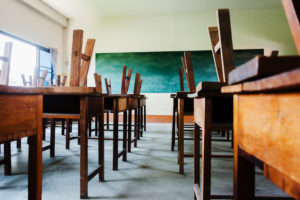 When I first heard that schools were closing due to COVID 19—indefinitely—and that parents would have to take over much of the teaching and entertaining, I thought (only half-jokingly) I wouldn’t wish that on my worst enemy. Add to that the social distancing regulations, which nixed all playdates and trips to the playground, and the joke became less funny.
When I first heard that schools were closing due to COVID 19—indefinitely—and that parents would have to take over much of the teaching and entertaining, I thought (only half-jokingly) I wouldn’t wish that on my worst enemy. Add to that the social distancing regulations, which nixed all playdates and trips to the playground, and the joke became less funny.
Having your life disrupted so dramatically is tough on anyone. Having your life and your kids’ lives turned upside down, well …
If you haven’t yet seen this YouTube video of an Israeli mom of four kids, who escaped to her car to tape a rant, please take a look. And, read the comments below it. I loved seeing how so many parents from so many countries felt her pain! It seems the struggles parents experience when kids are at home is universal.
The Novelty Wears Off
 I remember joyful snow days, when my kids were little. Bundling them up and sending them outside to play. Watching them jump into fresh, white powder or make giant, round snowballs. Building a snowman (or woman) and an igloo, hopefully big enough to climb into. And who could forget the sweetness of angels sculpted into the snow by little “angelic” bodies? After the outside fun, all of us spent the rest of the day indoors, warm, huddling together in sweats or P.J.’s, our cups of hot cocoa nearby. We’d pop an old, favorite movie or two into the VCR.
I remember joyful snow days, when my kids were little. Bundling them up and sending them outside to play. Watching them jump into fresh, white powder or make giant, round snowballs. Building a snowman (or woman) and an igloo, hopefully big enough to climb into. And who could forget the sweetness of angels sculpted into the snow by little “angelic” bodies? After the outside fun, all of us spent the rest of the day indoors, warm, huddling together in sweats or P.J.’s, our cups of hot cocoa nearby. We’d pop an old, favorite movie or two into the VCR.
And then, when I heard on the news that school would be closed a second day … somehow … the novelty wore off.
COVID 19 is no winter storm.
The Stress Can Lead to Breaking Points
Togetherness and bonding is lovely. There’s a lot to be said for slowing down and spending unscheduled time together. But the suddenness and the forced nature of it all, in the face of all our uncertainty and fear …
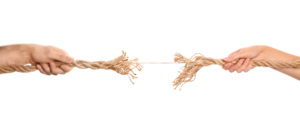 Having kids home for extended periods of time can be challenging on a good day—for both parents and kids. But having them home while trying to work from home, or when you’ve lost your job, can lead to a whole other level of stress. That stress, in turn, can lead to dangerous breaking points.
Having kids home for extended periods of time can be challenging on a good day—for both parents and kids. But having them home while trying to work from home, or when you’ve lost your job, can lead to a whole other level of stress. That stress, in turn, can lead to dangerous breaking points.
Coming from a social work background, my mind immediately goes to what happens to families already under stress. I go to where those breaking points can lead.
“Safer” Is Not Always Home
Thankfully, activists and workers in the field are way ahead of me. Jocelyn Noveck in her powerful article “With Isolation Abuse Activists Fear an ‘Explosive Cocktail”examines the effects that such a pandemic and resulting community lockdowns can create for some of the most at-risk children and women. “‘Safer at Home,’” Noveck begins her article, “It’s a slogan of choice for the mandatory confinement measures aimed at curbing the spread of the coronavirus.” But,” she tells us, “it’s not true for everyone.” Unfortunately, many children live in homes that do not provide the safety that every child needs.
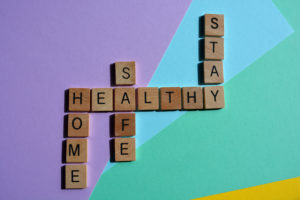
Unfortunately, children home from school are not the only ones at risk. Activists and workers fear a rise in all types of domestic violence brought on by the pandemic. This includes violence against women who are now spending much more time at home with abusive partners. Given the widespread number of shelter in place orders around the country, many “victims spend day and night trapped at home with their abusers, with tensions rising, nowhere to escape, limited or no access to friends or relatives—and no idea when it will end.”
Women Are Scared to Make the Calls
Related to mounting fears of increased violence is another great danger agencies are encountering: a decrease in the reporting of abuse.
On its face, a decrease in reporting might seem like a positive occurrence. Yet, receiving fewer calls does not necessarily reflect a decrease in abuse. Experts are afraid that women are now more afraid to make calls asking for help. “Being in such proximity with an abuser can turn the simple act of a phone call into such a a dangerous gamble,” Alisha Haridasani Gupta and Avivia Stahl explain in their illuminating article, “For Abused Women, a Pandemic Lockdown Holds Dangers of Its Own.”
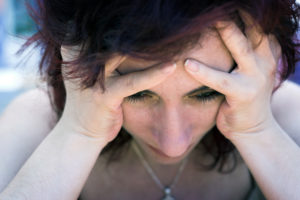 When calls do come in, they are often more challenging because of shelter in place restrictions. According to Katie Ray-Jones, the chief executive of the National Domestic Violence Hotline: “We’re having really difficult conversations, running through horrific scenarios … if an argument breaks out, where is the safest place in your house? Keep arguments out of the kitchen, out of the bathroom, which can be really dangerous spaces …” Organizations that support victims of domestic violence are seeing more and more texts coming in to their hotlines. They’ve also set up online chat services, staffed 24/7, to help address the changing need.
When calls do come in, they are often more challenging because of shelter in place restrictions. According to Katie Ray-Jones, the chief executive of the National Domestic Violence Hotline: “We’re having really difficult conversations, running through horrific scenarios … if an argument breaks out, where is the safest place in your house? Keep arguments out of the kitchen, out of the bathroom, which can be really dangerous spaces …” Organizations that support victims of domestic violence are seeing more and more texts coming in to their hotlines. They’ve also set up online chat services, staffed 24/7, to help address the changing need.
Shelters Are Also Feeling the Pinch
Women in partner abuse situations have other problems stemming from COVID 19. Many, who would under pre-pandemic circumstances go to the hospital when injured, are afraid of being exposed to the virus and, instead, choose to stay home. (People with all sorts of non-COVID emergencies are experiencing this same challenge.) In addition, emergency rooms are terribly overwhelmed. Medical professionals are unable, in many cases, to provide the care that they would have even just two weeks ago.
Shelters have also felt the pinch, with, according to Gupta and Stahl, “the constantly changing virus regulations, including implementing social distancing practices on site, taking temperatures of newcomers and regularly cleaning and disinfection common spaces.” Even if an abused woman goes to a shelter, because of social distancing regulations, there may not be room for her.
Back to the Kids
There has also been a decrease in the number of calls to child abuse hotlines across the country. El Paso County, Colorado, Department of Human Services, for example, gets close to 17,000 child abuse calls a year. They’ve documented a 43 percent drop in reporting since the COVID 19 outbreak began.
According to Noveck, Missouri has recorded a 50% drop in calls to their abuse and neglect hotline; Minnesota reports a 30% drop.
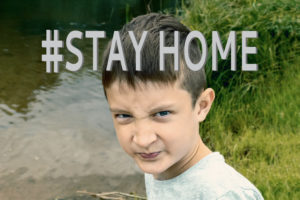 Out of school and out of childcare, kids are also out of the eyes of teachers, counselors, and health professionals. These professionals are all mandated reporters and are often the people agencies count on to call in instances of suspected abuse. Without those watchful eyes, many cases are falling through the cracks.
Out of school and out of childcare, kids are also out of the eyes of teachers, counselors, and health professionals. These professionals are all mandated reporters and are often the people agencies count on to call in instances of suspected abuse. Without those watchful eyes, many cases are falling through the cracks.
At-risk children suffer in other ways from sheltering in place as well. According to Vann R Newkirk II in his moving piece “The Kids Aren’t All Right” published in last week’s Atlantic “For children who spend time in multiple households, rely on outside figures for guidance or mentoring, or are used to a stream of relatives in and out of home, prolonged social-distancing measures will mean profound separation from some people who provide care. All the FaceTime in the world can’t make up for fill-in help from aunts, uncles, grandmothers, and gym coaches. And for some kids, those supports are the main things interceding in a toxic—or even dangerous—home environment.” Sheltering in place leads to major losses for many vulnerable children.
I’m Glad I’m Not Raising Kids During This Pandemic
When I shared the Israeli mother’s YouTube rant above with a dear friend of mine, we both had a good, hearty laugh. After we caught our breath, she said, “We dodged a bullet.” With our own kids grown and out of the house, I’m sure many of us can relate to those sentiments. I, for one, am glad I’m not raising small children during this pandemic for a whole host of reasons. But while I watch YouTube and count those blessings, I do think about others who are inconvenienced by the “break” from school. And I worry about those women and children for whom this additional stress raises the pandemic stakes to a whole other level of danger.
“Safer at home” is not true for everybody. Advocates around the country are asking for our help: keep an eye out for our neighbors and report suspicions of abuse or neglect. Keep hotline numbers handy to pass on to anyone you think may need the help. And … support organizations and agencies that serve those vulnerable among us. There truly are many vulnerable among us. Let’s not leave them on their own in the shadows.
Some Resources
Below is the information—directly from their websites—for two agencies to contact if you or anyone else you know is in need of help:
National Domestic Abuse Hotline
“For anyone affected by abuse and needing support 1-800-799-7233, or if you are unable to speak safely, you can log onto thehotline.org or text LOVEIS to 22522.”
Childhelp National Child Abuse Hotline “is a 24-hour hotline with resources to aid in every child abuse situation. All calls are confidential. Call 1-800-4-A-CHILD (1-800-422-4453) for help.” Or visit their website where live chat is available.
As always, I’d love to hear your thoughts. And during this challenging time, I’d especially love to hear any stories of inspiration or service, of people helping others in need, that you’re willing to share. Please leave a comment or send me an email.
May all your loved ones and neighbors be healthy and safe.
See you Monday, April 20th!
Diane



Hi Diane,
Your words spurred me to give more money to these causes.
I feel overwhelmed with sadness at times. It is hard enough for
Me & I am safe &. Well fed, I cannot imagine how it would be
W/out those things.
Take care of yourself!
Wonderful Nicky! I hope the post inspires others to do the same!
Take care of yourself too–be safe!
Diane. An engaging and important column. Thank you. Today’s Chicago Tribune reported an uptick in calls of domestic violence during this pandemic. It also reported that tighter restrictions on “help” arriving and/or the Court System intervening on the legal end are now in place. That’s just wrong. Additional resources for those being abused “Peace Over Violence” in Los Angeles. “Chicago Metropolitan Battered Women’s Network“. And for men who want help in redefining what it means to be a man today – “A Call To Men“ in New York. Thank you for all you do Diane. 🙏🏻💜
Thank you, Terry, for your insight and for the additional resources. I also have read recently that while the court system is considered essential, there have been many restrictions during the pandemic that have made getting help more difficult.
I am especially interested in “A Call to Men.” Thank you for bringing this to my attention and for heightening awareness that abuse and domestic violence is not just a “women and children” problem but one that we are all responsible for changing.
Thank you for what you do!
Thank you for bringing this to light Diane. It’s so important that we remember these populations and be aware of this in our communities.
Thank, Laura. These populations are often under the radar in the best of times. I’m glad the few articles I’ve highlighted have brought vulnerable women and children back into my awareness. I hadn’t, until I read them, considered what impact COVID19 and shelter in place would have on those whose shelters are not safe.
Oh dear. My niece is teaching Music!! classes online in Germany, while her two American kids have to continue their online educations In German. She should her computer and her hand holding a glass of wine.
I’ll check out the poor Israeli woman.
Yes, Greta! I feel for your niece and all the other women and men at home supervising their kids’ online learning while doing their best to complete their own work. A glass of wine may be in order–did you know that liquor stores are considered “essential” these days and are, along with supermarkets, allowed to keep their stores open during the pandemic?
Thank you Diane for addressing this issue. For many students and women in abusive environments, this scary time, for most of us, must be the worst nightmare for them.
Stay safe and healthy and listen to Vera Lynn “We’ll Meet Again.”
Thank you, Isabel, for your comment. I like the distinction you made–“scary time” for most of us, “the worst nightmare” for “students and women in abusive environments.”
Stay safe and healthy yourself, and thanks for the song recommendation!